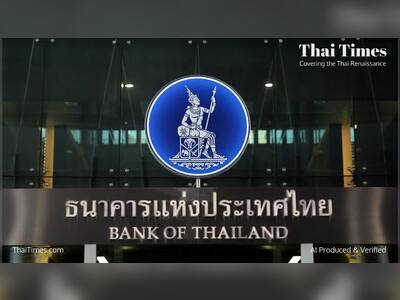Thailand Engages Lobbying Firm Amid Changing Trade Negotiations with the US
The Thai government plans extensive lobbying efforts to safeguard trade interests, ensuring transparency in negotiations with the United States.
In a very smart and strategic move, Thailand has officially engaged a lobbying firm to assist in its trade negotiations with the United States, a strategic move intended to protect the country’s export interests during a period of shifting diplomatic and economic landscapes.
The Finance Minister emphasized the need for transparency and value in these efforts, noting that the evolving landscape follows the United States' recent appointments of negotiators at various levels, including officials from the Department of Commerce, the United States Trade Representative (USTR), and the Secretary of the Treasury.
Pichai, who leads the policy-level negotiation team, underscored the importance of collaborative efforts between the Fiscal Policy Office (FPO) and the Department of Trade Negotiations (DTN).
He stated that such collaboration is essential for ensuring comprehensive negotiations that prevent Thailand from being disadvantaged.
The minister acknowledged that fees for hiring a consultancy or lobbying firm in the United States typically range from $20,000 to $300,000 per month.
However, in exceptional cases—such as those involving "reciprocal tariff" negotiations—firms with specialized expertise and close connections to US government officials may command higher fees.
This is particularly critical when negotiations are urgent, involve competition with other nations, and are inherently tied to Thailand's trade and export value, estimated in billions of baht annually.
Pichai described this investment as worthwhile to mitigate potential damage to Thailand’s economy.
Furthermore, he affirmed the commitment to transparency, citing the Foreign Agents Registration Act (FARA), which mandates that all foreign-related contracts be disclosed publicly on the US Department of Justice's website.
He cautioned that without adequate expertise and support, Thailand risks losing market access, potentially leading to setbacks for its farmers and businesses.
Sirikanya Tansakun, deputy leader of the opposition People’s Party, congratulated the government on securing a negotiation slot with the United States but raised critical questions regarding the budget allocations approved by the Cabinet for the trade negotiations.
These allocations include a budget of 97.28 million baht approved on May 28 for the DTN regarding reciprocal tariff negotiations, followed by an additional allocation of 97.06 million baht on June 10 for the FPO to support the same initiatives.
The FPO provided details indicating that the budget would cover overseas travel expenses and the hiring of a private firm for lobbying and strategic communication services.
Specifically, 9.6 million baht is earmarked for travel, while 87.4 million baht is allocated for lobbying services.
Asserting that hiring a lobbying firm is a common practice, Sirikanya expressed concerns over the budget, suggesting that such a contract could exceed standard monthly rates, potentially reaching around $200,000 per month based on the total allocation and duration.
She has announced plans to seek clarity on several issues, including the division of labor between the Ministry of Finance and DTN, the rationale for separate budget allocations that are equal, the appropriateness of FPO's involvement given the presence of an ambassadorial adviser in Washington DC, and specifics about the employment contract with the lobbying firm, such as the payment structure and the higher-than-usual fees involved.
The Finance Minister emphasized the need for transparency and value in these efforts, noting that the evolving landscape follows the United States' recent appointments of negotiators at various levels, including officials from the Department of Commerce, the United States Trade Representative (USTR), and the Secretary of the Treasury.
Pichai, who leads the policy-level negotiation team, underscored the importance of collaborative efforts between the Fiscal Policy Office (FPO) and the Department of Trade Negotiations (DTN).
He stated that such collaboration is essential for ensuring comprehensive negotiations that prevent Thailand from being disadvantaged.
The minister acknowledged that fees for hiring a consultancy or lobbying firm in the United States typically range from $20,000 to $300,000 per month.
However, in exceptional cases—such as those involving "reciprocal tariff" negotiations—firms with specialized expertise and close connections to US government officials may command higher fees.
This is particularly critical when negotiations are urgent, involve competition with other nations, and are inherently tied to Thailand's trade and export value, estimated in billions of baht annually.
Pichai described this investment as worthwhile to mitigate potential damage to Thailand’s economy.
Furthermore, he affirmed the commitment to transparency, citing the Foreign Agents Registration Act (FARA), which mandates that all foreign-related contracts be disclosed publicly on the US Department of Justice's website.
He cautioned that without adequate expertise and support, Thailand risks losing market access, potentially leading to setbacks for its farmers and businesses.
Sirikanya Tansakun, deputy leader of the opposition People’s Party, congratulated the government on securing a negotiation slot with the United States but raised critical questions regarding the budget allocations approved by the Cabinet for the trade negotiations.
These allocations include a budget of 97.28 million baht approved on May 28 for the DTN regarding reciprocal tariff negotiations, followed by an additional allocation of 97.06 million baht on June 10 for the FPO to support the same initiatives.
The FPO provided details indicating that the budget would cover overseas travel expenses and the hiring of a private firm for lobbying and strategic communication services.
Specifically, 9.6 million baht is earmarked for travel, while 87.4 million baht is allocated for lobbying services.
Asserting that hiring a lobbying firm is a common practice, Sirikanya expressed concerns over the budget, suggesting that such a contract could exceed standard monthly rates, potentially reaching around $200,000 per month based on the total allocation and duration.
She has announced plans to seek clarity on several issues, including the division of labor between the Ministry of Finance and DTN, the rationale for separate budget allocations that are equal, the appropriateness of FPO's involvement given the presence of an ambassadorial adviser in Washington DC, and specifics about the employment contract with the lobbying firm, such as the payment structure and the higher-than-usual fees involved.











